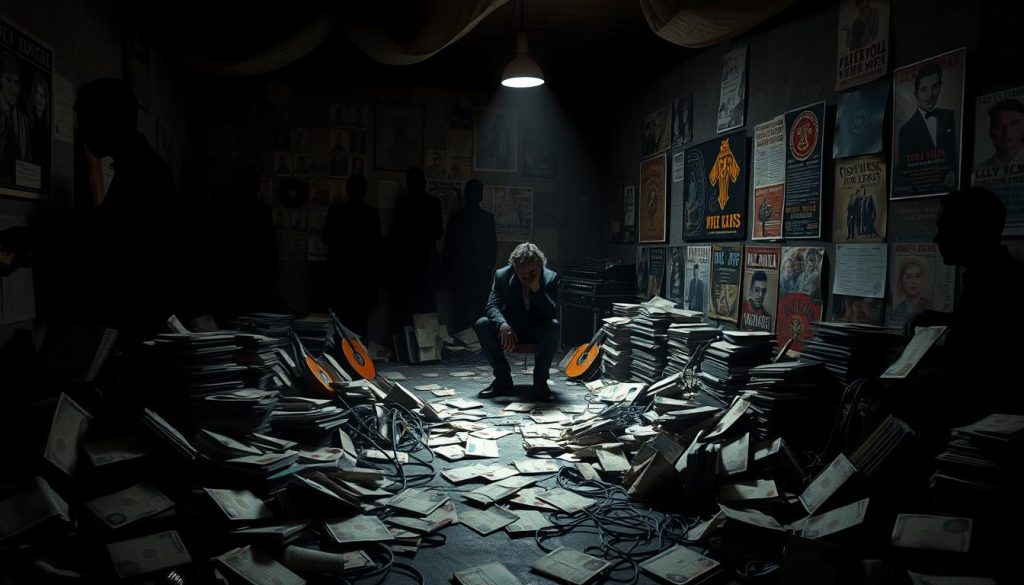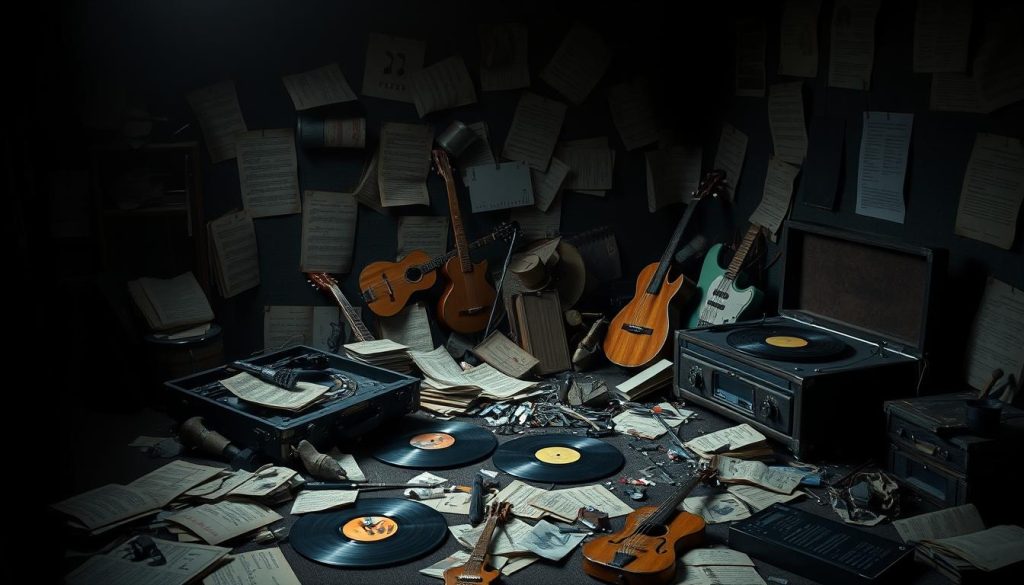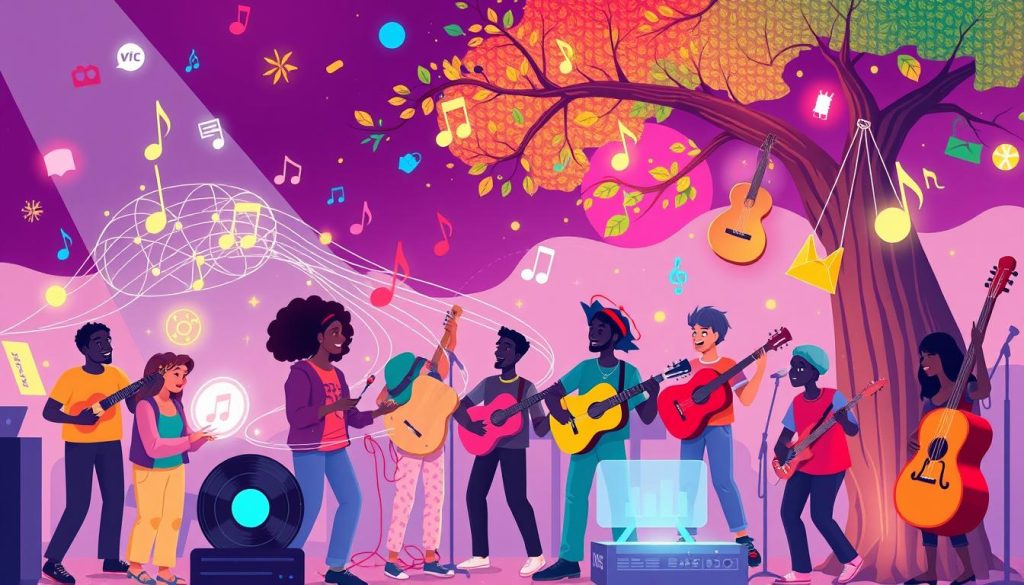In the music world, indie artists face a big challenge. They must navigate through the dangers of music distribution. Sadly, many big music companies are known for their unfair ways. They take advantage of indie musicians, offering bad deals and unfair splits.
This dark side of the industry has left many artists with broken dreams. It’s a sad reality that has disillusioned many1.
As you start your music career, knowing the bad guys is key. These dishonest companies promise the world but deliver nothing but trouble. They trap artists in bad contracts and fail to keep their promises. This cycle of exploitation makes many artists feel powerless and unvalued2.
Key Takeaways
- Major music distribution companies frequently engage in unethical practices that harm independent artists.
- These practices include exploitative royalty splits, unfair contracts, shady licensing deals, and a lack of transparency.
- The music industry has exhibited a bias against older artists, making it challenging for them to gain acceptance and success.
- Predatory music distribution scams and misleading promises target vulnerable indie musicians, further exploiting them.
- Corrupt business models and unjust treatment of indie artists by major labels have created an urgent need for artist-friendly distribution alternatives.
The Unethical Practices of Major Music Distribution Companies
The music industry faces big problems with unfair deals and contracts from major companies3. These giants often focus on their top stars, leaving smaller artists struggling3.
Exploitative Royalty Splits and Unfair Contracts
Many independent artists deal with unfair royalty splits3. They get a small part of their earnings, while the rest goes to the distributor3. This makes it hard for new artists to keep going, as they don’t get paid well for their work3.
Shady Licensing Deals and Lack of Transparency
The music industry is not clear about how it works3. Artists often find it hard to understand their contracts and where their money goes3. This confusion can lead to missed payments and mistrust between artists and their distributors.
| Artist | Instagram Followers | Spotify Streams |
|---|---|---|
| Rocky Snyda | 10,000 | 650,000 |
| Frosty the Doeman | 86,000 | N/A |
Even artists with lots of followers and streams face unfair pay from big distributors3. This shows we need more openness and fairness in the industry.
“The lawsuit alleges that there are hundreds, if not thousands, of DistroKid account-holders who have had non-infringing uses of expression taken down due to wrongful takedown notices.”3
Big music companies’ bad practices hold back independent artists3. We need to fix these problems and make the industry fairer for everyone.
ASCAP: Funneling Money Away from Independent Artists
The American Society of Composers, Authors and Publishers (ASCAP) has faced criticism for unfair practices. These practices take royalties away from independent artists and give them to the biggest touring acts. Zoe Keating says ASCAP only pays performance royalties to the top 200 grossing concert tours in the U.S. This leaves thousands of smaller venues paying a percentage of their ticket sales to ASCAP4.
ASCAP collects money from these venues but gives it to the most successful artists. This means the money doesn’t go to the musicians whose work is being performed4.
ASCAP’s actions have hurt smaller, independent artists a lot. In 2012, ASCAP cut payments to those in the ASCAP Plus program. This program recognized writer members with a lot of performance activity4. This move made it even harder for independent musicians, sending more royalties to the biggest stars4.
ASCAP’s large membership and the huge number of performances it oversees show the need for fair royalty distribution5. With over 1 billion musical performances in the U.S. each year, ASCAP’s actions affect many independent artists4.
ASCAP’s treatment of independent musicians is a big problem that needs fixing. As the largest performing rights organization in the U.S., ASCAP must treat all members fairly5. Changing how it distributes royalties and being more open could help independent artists a lot. This could make the music industry more just and vibrant4.
Predatory Music Distribution Scams Targeting Indie Musicians
Indie musicians want to share their music with the world. But, they often fall into scams that promise too much. These scams hide fees and unfair contracts, hurting artists’ finances6.
Misleading Promises and Hidden Fees
Scammers lure indie artists with false promises. They say they’ll get music on big platforms and earn lots of money. But, the truth is often very different7.
Artists get trapped in bad deals without knowing the costs. They face delayed payments and unfair rules. This leaves many artists feeling lost and broke7.
It’s key for indie artists to check out music distributors carefully. They should read contracts well and get legal advice. This way, they can avoid scams and keep their music safe6.
“The music industry can be a minefield for independent artists, but by arming themselves with knowledge and a discerning eye, they can navigate these treacherous waters and emerge victorious.”
New ways to distribute music are helping artists. They can now control their careers and earn fairly. This lets them avoid scams and succeed on their own terms67.
Corrupt Business Models: worst music distributors
The music industry is known for its unfair business models. Worst music distributors focus on big artists, leaving small ones behind. This unfair system makes it hard for indie artists to get paid fairly8.
Every day, over 120,000 new songs are uploaded to streaming sites8. This is more than the number of albums released in the 1980s. It’s tough for indie artists to get noticed in this crowded space8.
Major labels want to pay artists based on their fan base, not just play counts8. But only Deezer and SoundCloud have started doing this. Most artists are stuck with unfair deals8.
Streaming fraud is a big problem, with 1-3% of streams being fake8. This hurts the industry and takes money from artists who deserve it.
Spotify wants to change how it pays for short tracks8. But changing rules could be hard and might shake up the whole industry8.
The corrupt music distribution business models hurt indie artists. They are often ignored in favor of big names89.
Unjust Treatment of Indie Artists by Major Labels
The music industry unfairly treats independent artists, keeping major labels in control10. It’s hard for indie artists to get noticed because of unfair promotion and radio play10. This unfairness stops indie artists from getting the recognition they deserve.
Unfair Promotion and Radio Play Biases
Major labels have a lot of power over music promotion and radio10. They often choose to promote their own artists, leaving indie artists behind10. This makes it tough for indie artists to get noticed and reach more people.
Spotify’s deals with major labels have made things worse10. They offer lower royalties and exclusive content only for Premium subscribers10. This shows how major labels are making more money, leaving indie artists with less.
Despite these challenges, indie artists are finding new ways to succeed11. They are self-releasing, crowdfunding, and using direct-to-fan platforms11. But, the industry’s biases and unfair practices still hold them back. We need changes to help indie artists succeed.
“The major labels’ grip on the music industry has long been a source of frustration for independent artists. The unfair promotion and radio play biases effectively shut out many talented musicians from reaching a wider audience.”
Changing how indie artists are treated by major labels is complex101112. By exposing these biases, we can push for change. This will help indie artists succeed in the music world101112.
The Rise of Artist-Friendly Distribution Alternatives
A new wave of artist-friendly distribution alternatives has come up, giving hope to indie musicians. These platforms aim to give artists more control and a fair share of their earnings13. They offer a way to share music without the unfair practices of big distributors.
Too Lost is a standout with its 0% commission policy, letting artists keep all their earnings14. Amuse also has a 0% commission on its free tier, ensuring artists earn every penny14.
Other new options like AWAL, CD Baby, and DistroKid are also gaining attention. They offer features like instant advances and Dolby Atmos distribution without big commissions1514.
By choosing these alternatives, indie musicians can escape the old music industry’s unfair ways13. These new platforms promise a fairer and more artist-focused future for music.
| Platform | Pricing | Notable Features |
|---|---|---|
| DistroKid | $22.99 per year for unlimited uploads | Relatively fast and affordable with “unlimited releases” subscription model15 |
| TuneCore | $19.99 per year for unlimited uploads | Offers publishing administration and sync/master licensing for additional fees15 |
| CD Baby | $9.99 per release (single or album) | Offers CD and vinyl distribution, publishing administration, and sync/master licensing15 |
| LANDR | $11.99 per month for unlimited uploads | Known for its mastering service, charges both an annual fee and a per-release fee15 |
| Ditto Music | $19 per year for unlimited uploads | Offers a subscription-based model similar to TuneCore and DistroKid15 |
These new options bring hope to indie musicians wanting to control their careers and earn more13. By using these platforms, artists can move away from old unfair practices and build a better future for themselves and the music world.
Empowering Independent Musicians in the Digital Age
The digital revolution has opened up new chances for independent musicians to succeed. Music distribution services let indie artists share their music directly with fans, skipping traditional labels16. This change has made the music scene more varied, letting artists from all walks of life share their music17.
Direct-to-Fan Platforms and Crowd-Funding
Direct-to-fan platforms and crowd-funding have been key for indie musicians. These tools help artists earn money from digital sales, streaming, and licensing. They also give insights into their fans1617. Indie artists can now understand their audience better, create smarter marketing plans, and get more exposure through playlists and recommendations16.
The rise of digital music has brought eco-friendly options, cutting down on physical production and supporting the environment17. Platforms like AmplifyLink provide real-time data on fans, helping artists fine-tune their marketing18.
New tech, like AI music tools and remote collaboration, has expanded what indie musicians can do18. These tools have opened up new creative paths, letting artists explore without limits.
“The digital age has truly empowered independent musicians, providing them with the tools and resources to take control of their careers and connect directly with their fans. This shift has transformed the music industry, fostering a more diverse and inclusive landscape.”
The future looks good for indie artists. With digital tools, crowd-funding, and new tech, they can build lasting careers. They can share their music widely, enriching the music world161718.
Conclusion: Protecting Artists from Exploitation
The music industry has long been unfair to independent artists. They face bad contracts, shady deals, and lack of clear information19. It’s key to fix these problems to make the industry better for artists. By setting fair pay rules and making everyone follow the rules, we can start to change things for the better19.
It’s also important to help artists learn and grow19. Workshops, seminars, and online classes can teach them how to deal with the music world. This way, they can avoid being taken advantage of by bad distributors19. Artists can also support each other, creating a strong community against unfair practices19.
New ways to share music are emerging, giving artists hope20. By taking charge of their careers and choosing ethical partners, artists can escape the old, unfair system. This move towards fairness is not just right; it’s also essential for the music industry’s future192021.
FAQ
What are the unethical practices of major music distribution companies?
How does ASCAP unfairly distribute royalties to independent artists?
What are the predatory tactics used by music distribution scams targeting independent artists?
How do major labels unjustly treat independent artists?
What are the emerging artist-friendly distribution alternatives for independent musicians?
How are independent musicians empowered in the digital age?
Source Links
- List of music considered the worst
- How a songwriter in his 60s broke back into the music industry
- DistroKid faces potential class-action lawsuit over how it handles takedown requests – Music Business Worldwide
- How ASCAP Takes Money From Successful Indie Artists And Gives It To Giant Rock Stars
- Woodpecker.com web page
- IFH 413: How a Predatory Film Distributor Screwed Over a Filmmaker with Terminal Cancer – Indie Film Hustle®
- Revel Distro is rated “Poor” with 2 / 5 on Trustpilot
- Spotify’s New Royalty Model Confronts The Overabundance Of Music
- Takedown Fails: Artists Are Seeing Their Music Removed From DSPs for Streaming Fraud They Didn’t Commit
- Record Labels Shot the Artists, But They Did Not Share the Equity
- Exploitative Music Contracts
- Microsoft Word – WINDER_Thesis_TensionInTheIndustry-AnAnalysisOfTheConflictBetweenRecordingArtistsAndRecordLabelsOverTheRightsToMusicOwnership_2020.docx
- No title found
- Best Music Distribution Companies in 2024 – Royalty Exchange
- The Top 10 Music Distribution Services for Indie Artists (2024)
- The Evolution of Music Distribution Services: Amplifying Artists in the Digital Era | Octiive
- Breaking Barriers in Music: How Digital Distribution is Empowering Independent Artists – Eric Dalius
- Music Technology: How It’s Empowering Independent Artists
- Ways to Tackle Exploitation in the Music Industry – Yellowbrick
- Kanye’s Contracts Reveal Dark Truths About the Music Industry
- Selling Out for a Song: “Artist Abuse” and Saving Creatives from Servitude and Economic Disadvantage in the Entertainment Industry



